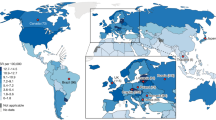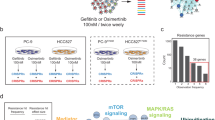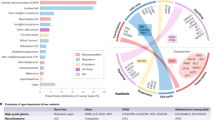Abstract
5–10% of total prostate cancer (PCa) cases are hereditary. Particularly, immune checkpoint inhibitor-sensitive tandem duplicator phenotype (TDP) accounts for 6.9% of PCa cases, whereas genetic susceptibility genes remain completely unknown. We identified a Chinese family with two PCa patients, in which the PCa phenotype co-segregated with a rare germline variant EGFRR831H. Patient-derived conditionally reprogrammed cells (CRC) exhibited increased EGFR and AKT phosphorylation, and a sensitivity to EGFR antagonist Afatinib in migration assays, suggesting the EGFR allele was constitutively active. Both EGFRR831H-mutant tumours contained biallelic CDK12 inactivation, together with prominent tandem duplication across the genome. These somatic mutations could be detected in urine before surgery. Analysis of public databases showed a significant correlation between the mutation status of EGFR and CDK12. Taken together, our genetic and functional analyses identified a previously undescribed link between EGFR and PCa.
This is a preview of subscription content, access via your institution
Access options
Subscribe to this journal
Receive 50 print issues and online access
$259.00 per year
only $5.18 per issue
Buy this article
- Purchase on Springer Link
- Instant access to full article PDF
Prices may be subject to local taxes which are calculated during checkout




Similar content being viewed by others
References
Wu YM, Cieslik M, Lonigro RJ, Vats P, Reimers MA, Cao X, et al. Inactivation of CDK12 delineates a distinct immunogenic class of advanced prostate cancer. Cell. 2018;173:1770. e1714.
Tonon L, Fromont G, Boyault S, Thomas E, Ferrari A, Sertier AS, et al. Mutational profile of aggressive, localised prostate cancer from African Caribbean men versus European ancestry men. Eur Urol. 2019;75:11–15.
Attard G, Parker C, Eeles RA, Schroder F, Tomlins SA, Tannock I, et al. Prostate cancer. Lancet. 2016;387:70–82.
Frank C, Sundquist J, Hemminki A, Hemminki K. Familial associations between prostate cancer and other cancers. Eur Urol. 2017;71:162–5.
Giri VN, Beebe-Dimmer JL. Familial prostate cancer. Semin Oncol. 2016;43:560–5.
Lynch HT, Kosoko-Lasaki O, Leslie SW, Rendell M, Shaw T, Snyder C, et al. Screening for familial and hereditary prostate cancer. Int J Cancer. 2016;138:2579–91.
Pilie PG, Johnson AM, Hanson KL, Dayno ME, Kapron AL, Stoffel EM, et al. Germline genetic variants in men with prostate cancer and one or more additional cancers. Cancer. 2017;123:3925–32.
Giri VN, Hegarty SE, Hyatt C, O’Leary E, Garcia J, Knudsen KE, et al. Germline genetic testing for inherited prostate cancer in practice: Implications for genetic testing, precision therapy, and cascade testing. Prostate. 2019;79:333–9.
Armenia J, Wankowicz SAM, Liu D, Gao J, Kundra R, Reznik E, et al. The long tail of oncogenic drivers in prostate cancer. Nat Genet. 2018;50:645–51.
Lu S, Yu Y, Li Z, Yu R, Wu X, Bao H, et al. EGFR and ERBB2 germline mutations in Chinese lung cancer patients and their roles in genetic susceptibility to cancer. J Thorac Oncol. 2019;14:732–6.
Yuan Y, Sheng Z, Liu Z, Zhang X, Xiao Y, Xie J, et al. CMTM5-v1 inhibits cell proliferation and migration by downregulating oncogenic EGFR signaling in prostate cancer cells. J Cancer. 2020;11:3762–70.
Liu X, Krawczyk E, Suprynowicz FA, Palechor-Ceron N, Yuan H, Dakic A, et al. Conditional reprogramming and long-term expansion of normal and tumor cells from human biospecimens. Nat Protoc. 2017;12:439–51.
Liu W, Ju L, Cheng S, Wang G, Qian K, Liu X, et al. Conditional reprogramming: modeling urological cancer and translation to clinics. Clin Transl Med. 2020;10:e95.
Luo Y, Ju L, Wang G, Chen C, Wang Y, Chen L, et al. Comprehensive genomic profiling of urothelial carcinoma cell lines reveals hidden research bias and caveats. Clin Transl Med. 2020;10:294–6.
Yu HA, Arcila ME, Harlan Fleischut M, Stadler Z, Ladanyi M, Berger MF, et al. Germline EGFR T790M mutation found in multiple members of a familial cohort. J Thorac Oncol. 2014;9:554–8.
Matsushima S, Ohtsuka K, Ohnishi H, Fujiwara M, Nakamura H, Morii T, et al. V843I, a lung cancer predisposing EGFR mutation, is responsible for resistance to EGFR tyrosine kinase inhibitors. J Thorac Oncol. 2014;9:1377–84.
Leest Cvd, Wagner A, Pedrosa RM, et al. Novel EGFR V834L germline mutation associated with familial lung adenocarcinoma. JCO Precis Oncol. 2018;2:1–5.
Menghi F, Barthel FP, Yadav V, Tang M, Ji B, Tang Z. et al. The tandem duplicator phenotype is a prevalent genome-wide cancer configuration driven by distinct gene mutations. Cancer Cell. 2018;34:197–210.e195.
Acknowledgements
We thank the patients and their family members for participating in our study. We gratefully acknowledge excellent technical assistance provided by Ms. Yuan Zhu, Ms. Shanshan Zhang, and Ms. Yayun Fang from Zhongnan Hospital of Wuhan University. We would like to acknowledge the TCGA and COSMIC databases for providing use of data free of charge. We also thank International Science Editing (http://www.internationalscienceediting.com) for editing this manuscript.
Funding
This study was supported in part by grants from the Health commission of Hubei Province scientific research project (WJ2019H080), Chinese Central Special Fund for Local Science and Technology Development of Hubei Province (2018ZYYD023), Science and Technology Department of Hubei Province Key Project (2018ACA159), and Wuhan Science and Technology Bureau Key Project (2018061005132294). The funders had no role in study design, data collection and analysis, decision to publish, or preparation of the manuscript.
Author information
Authors and Affiliations
Corresponding authors
Ethics declarations
Conflict of interest
The authors declare that they have no conflict of interest.
Statement of patient consent
All PCa patients, family members of the PCa pedigree, and additional cancer patients, provided written informed consent. All study procedures were performed in accordance with the ethical standards of the Institutional Ethics Review Committee.
Additional information
Publisher’s note Springer Nature remains neutral with regard to jurisdictional claims in published maps and institutional affiliations.
Supplementary information
Rights and permissions
About this article
Cite this article
Qian, K., Wang, G., Ju, L. et al. A novel germline EGFR variant p.R831H causes predisposition to familial CDK12-mutant prostate cancer with tandem duplicator phenotype. Oncogene 39, 6871–6878 (2020). https://doi.org/10.1038/s41388-020-01476-9
Received:
Revised:
Accepted:
Published:
Issue Date:
DOI: https://doi.org/10.1038/s41388-020-01476-9
This article is cited by
-
Lung cancer in patients who have never smoked — an emerging disease
Nature Reviews Clinical Oncology (2024)



